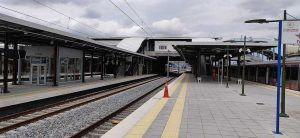 The General Directorate of Infrastructure Investments (AYGM) of the Ministry of Transport and Infrastructure of Turkey awarded Assystem a contract to oversee the development of the new high-speed electrified railway line between Ispartakule and Çerkezköy.
The General Directorate of Infrastructure Investments (AYGM) of the Ministry of Transport and Infrastructure of Turkey awarded Assystem a contract to oversee the development of the new high-speed electrified railway line between Ispartakule and Çerkezköy.
Under the 51-month contract, Assystem will monitor the delivery of the whole project and will provide a range of technical support activities for AYGM’s project implementation unit (PIU).
The services provided by Assystem will include environmental and social implementation support and compliance management, training of the AYGM’s PIU, procurement and contract implementation support, technical railway engineering support, review of design and technical specifications, financial documentation compliance management and reporting, and project monitoring and evaluation.
The project involves the construction of a 67 km section equipped with the ERTMS Level 1 allowing trains to run at ta maximum speed of 200 km/h.
The construction of Ispartakule – Çerkezköy rail section is financed by the EBRD with a EUR 150 million loan and by the AIIB that approved a EUR 300 million financing.
The double high-speed electrified railway connection is part of the Halkali – Kapikule project that will reduce carbon emissions and connect Turkey to the Trans-European Transport Network (TEN-T) via Bulgaria.
The Halkali –Kapikule railway line is implemented into two main phases including the Çerkezköy-Kapikule (Phase 1) while the second phase comprises two stages covering the Halkali-Ispartakule and Ispartakule-Çerkezköy sections.
The entire EUR 1 billion project which has received a EUR 275 million grant from the European Union, involves the construction of a 153 km line, two tunnels and 16 bridges. The new double track connection will reduce the travel time from currently 8 hours to 3.5 hours connecting Edirne, Kırklareli and Tekirdağ to the high-speed rail network.
Following the completion, the capacity of the line will increase by four times. According to the estimations, the freight transport on the line will increase from 1.53 million tonnes to 9.6 million tonnes per year and the passenger ridership will reach 3.4 million, from currently 600,000 passengers.
Share on:



